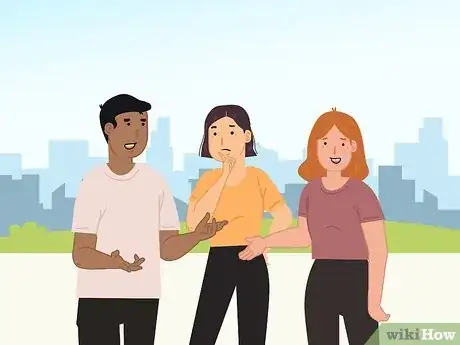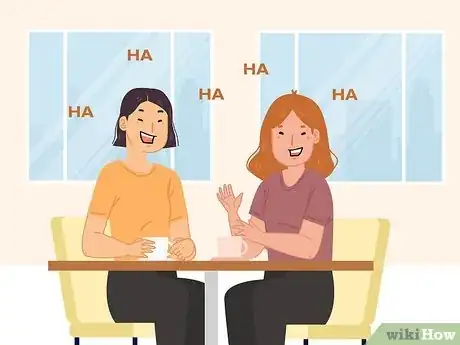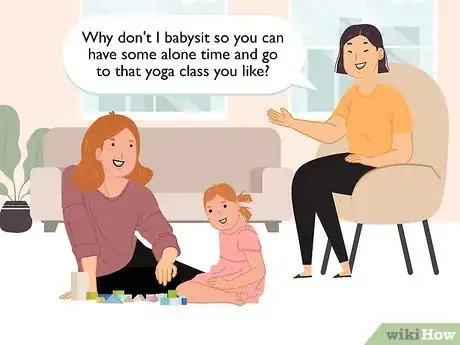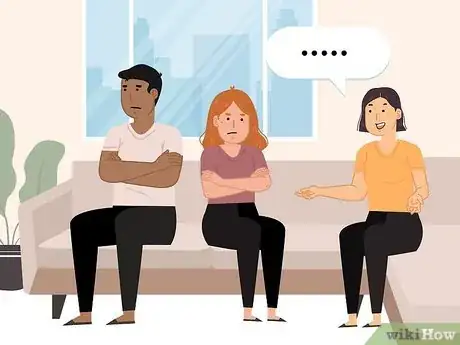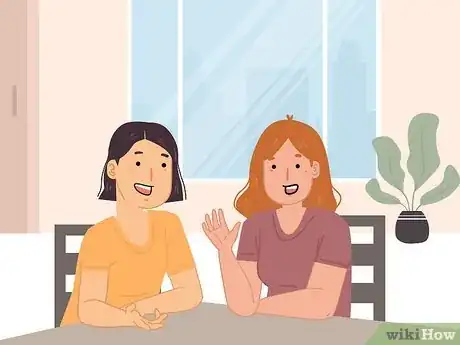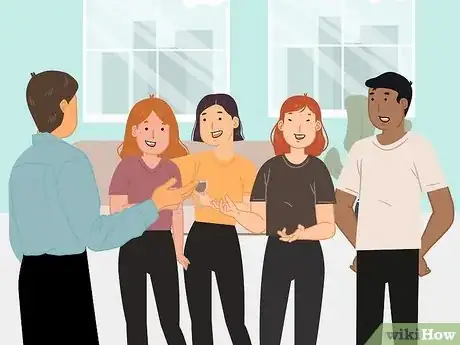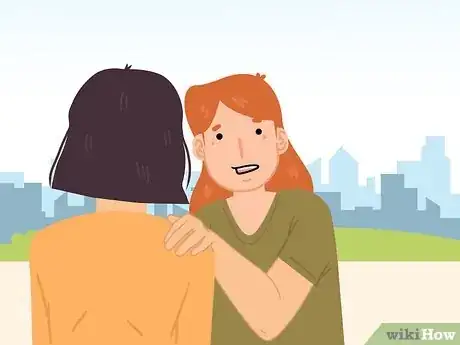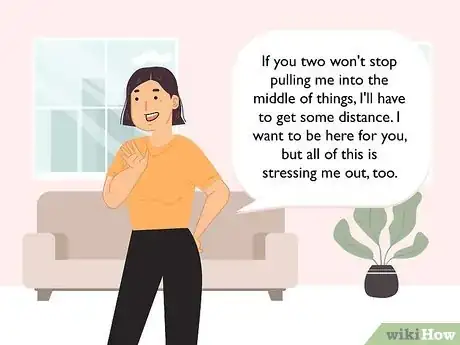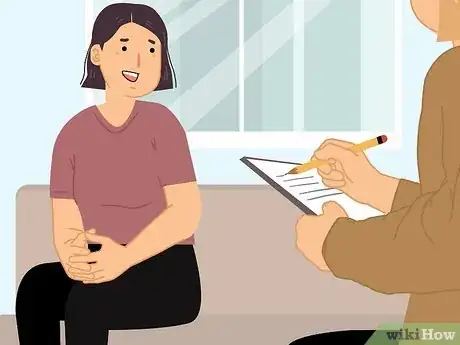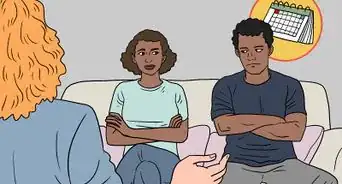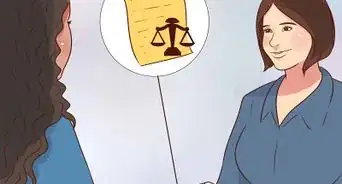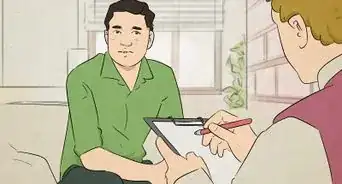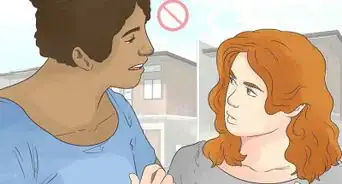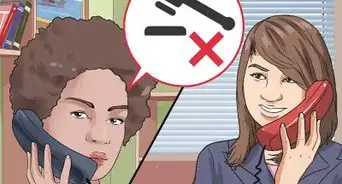This article was co-authored by Trudi Griffin, LPC, MS. Trudi Griffin is a Licensed Professional Counselor in Wisconsin specializing in Addictions and Mental Health. She provides therapy to people who struggle with addictions, mental health, and trauma in community health settings and private practice. She received her MS in Clinical Mental Health Counseling from Marquette University in 2011.
There are 10 references cited in this article, which can be found at the bottom of the page.
This article has been viewed 78,538 times.
If two of your friends are getting a divorce, you may find yourself in an awkward position. All of you probably won't be hanging out together anymore and you might feel caught in the middle of a tug-of-war. Still, that doesn't mean you can't try your best to stay loyal and true to your friends after a split. Keep being a good friend to both parties in a divorce by being supportive, making your position clear, and setting realistic expectations.
Steps
Offering Your Support
-
1Listen to both of your friends. Supporting a friend through divorce is a major hurdle, but you can offer valuable help just by listening. Hear them out when they need to go over what happened for the thousandth time. There will come a time when they won't need to discuss it so much, but for now just be there with open ears.[1]
- Keep in mind that listening doesn't mean agreeing. You can hear your friends out without endorsing their opinions or badmouthing the other friend.
- Establish boundaries. It's important to listen to both parties, but it's also important to make sure you're not crossing a line. You may want to limit the amount of time you want to talk about the divorce, or you could ask them not to talk negatively about one another to you.
-
2Show that you understand their position. Each of your friends will need validation in their own way. Show empathy based on their individual personalities and preferences. This might mean offering a shoulder to cry on or saying comforting things like “I can see you're hurting.”[2]
- Offer validation and support as needed, but do not join in on shaming or alienating statements made about the other spouse.
Advertisement -
3Encourage them to make healthy decisions. Going through a divorce is a taxing ordeal for the mind, body, and spirit. Help your friends get through this difficult time by encouraging them to eat right, get plenty of exercise, sleep, and perform self-care.[3]
- Offer to make a nutritious dinner with them once a week. Or accompany them to the gym for a workout class.
- Discourage your friends from using alcohol, drugs, or other unhealthy habits to cope with the divorce.
-
4Make them laugh. Laughter truly is a form of medicine. When your friend needs uplifting, be there to cheer them up with light-hearted jokes or other forms of humor. If you're not much of a comedian, using a bit of wit can work just as well.[4]
- You can also send them online jokes, memes, or YouTube videos that spark laughter.
-
5Help out. One important way to support your divorcing pals is by caring for their children or doing tasks around the home. As they adjust to being single, they may both need a sitter or other assistance. Offer your services whenever you're free.[5]
- You might say, “Why don't I babysit so you can have some alone time and go to that yoga class you like?”
Clarifying Your Position
-
1Make it clear that you're not taking sides. Use the first several days and weeks of the divorce process to make your position clear. No matter how civil they are with one another, at some point your friends may expect you to judge the other spouse. Stay neutral, no matter what.[6]
- You might say something like, “Charlotte, I want to keep being friends with both you and Greg. I'm sorry, but I won't be taking sides.”
- You may also opt to take a break or spend less time with both parties until they figure out the details of their separation. Even then, it's possible that no matter how well-intentioned you are, one party could perceive you not taking any sides at taking the other's side.
-
2Create a workable game plan. Sit down with both spouses and agree on some rules so that both friendships can thrive. This may seem weird, like another aspect of the divorce settlement, but it's necessary. Clearly outlining appropriate behaviors can prevent you from being caught in the middle of a tug-of-war.[7]
- The rules you set will depend on your unique circumstances. Some suggestions, however, are including sections about not speaking poorly about one another, not expecting friends to spy, and not pulling rank (i.e. saying “They were my friends first!”).
- If it's illogical to expect both spouses to be present, create an online document that you can email to both.
-
3Redefine the friendships. If all of you were mutual friends, the way your friendship works will likely have changed. That's okay—just change with it. Think about what you cherish and value about both friends. What kinds of things do you do together?[8]
- Have separate meetings with each friend and talk about how your friendship will be moving forward.
- Try keeping your friendships event-focused for a while. Center your hangouts around activities or events. That way they will be more focused on what you're doing in the moment instead of on their divorce.
- For example, you might see one of the spouses regularly at the country club and play tennis together. You might be involved in the same community organization with the other. Use these “typical” routines as a guideline for how you might continue the friendship in the future.
-
4Decide how to handle social events. You and the spouses will also have to agree on a protocol for social events. If you host an event, will both be able to attend and act cordially? Think about how you want to manage their attendance at various social functions.[9]
- If both spouses are able to act civilly, you might invite them both and seat them far apart.
- If both spouses cannot act civilly, you might suggest that the person most connected to the event attends. For example, the spouse who helped you with a fundraiser might be invited to the charity ball.
- Remember that you are not their referee. Even if you want both parties to attend, the decision is up to them. Let them know that the other person will be there, and let them decide if they can handle that on their own.
Being Realistic
-
1Expect backlash from one side or the other. No matter how fairly you try to handle this matter, there's a strong chance that one spouse will feel upset and betrayed by your continued loyalty towards the other. Don't feel guilty about the push-back. [10]
- Simply restate your commitment to maintaining both friendships and work hard to preserve the relationships. Even then, know that one side may no longer want to be friends because of your relationship with their ex. Respect their decision if that's the case.
-
2Get support for yourself. Being pulled between two divorcing friends can be stressful. Be sure to reach out to unbiased friends and family members to talk or hang out. Spending time with others might serve as a release from the tension of the divorce.[11]
- What's more, you have probably devoted a lot of time and energy to be there for your friends. You also need someone to be there for you.
-
3Give it some time. Be patient with your friends and try not to expect too much from them early on. In general, divorces can be messy. As some time passes, the friction may lessen. You might even begin to feel like your time spent with each of them is “just like old times.”[12]
-
4Recognize when it becomes too much. Having two good friends suddenly despise each other can be hectic. You might notice yourself feeling more tense, stressed, or irritated. If even after a great deal of time has passed you continue to feel pulled between the two, you might decide to take a step back.[13]
- Of course, you don't want to abandon your friendships. But, you also need to recognize when the tension is just too much for you. It may be time for you to get some distance until things cool off.
- You might get distance by asking another friend to fill in for you at an event or for your babysitting duties. You might also enforce your boundaries about the rules.
- You might tell them, "If you two won't stop pulling me into the middle of things, I'll have to get some distance. I want to be here for you, but all of this is stressing me out, too."
-
5See a therapist. If the stress starts to affect your functioning at work or school or you find yourself having trouble sleeping, it may help to talk to someone. A professional therapist can help you set better boundaries with your divorcing friends. This person can also help you develop a self-care routine to better manage stress.[14]
- In the initial session, you might explain, "Two of my good friends are divorcing and I feel caught in the middle. How can I be a good friend to both of them without losing my mind?"
References
- ↑ http://www.prevention.com/sex/phrases-avoid-saying-people-divorce
- ↑ https://www.parent.com/8-meaningful-ways-to-support-a-friend-through-a-divorce/
- ↑ http://health.usnews.com/health-news/health-wellness/articles/2015/03/26/how-to-stay-healthy-during-a-divorce
- ↑ http://www.scarymommy.com/help-friend-divorce/
- ↑ https://www.parent.com/8-meaningful-ways-to-support-a-friend-through-a-divorce/
- ↑ https://beta.theglobeandmail.com/life/health-and-fitness/ask-a-health-expert/my-friends-are-getting-divorced-i-dont-want-to-choose-sides-help/article14019326/?ref=http://www.theglobeandmail.com&
- ↑ https://beta.theglobeandmail.com/life/health-and-fitness/ask-a-health-expert/my-friends-are-getting-divorced-i-dont-want-to-choose-sides-help/article14019326/?ref=http://www.theglobeandmail.com&
- ↑ http://www.womansday.com/relationships/family-friends/advice/a5881/divorce-etiquette-101-124065/
- ↑ http://www.womansday.com/relationships/family-friends/advice/a5881/divorce-etiquette-101-124065/
- ↑ https://www.psychologytoday.com/blog/because-im-the-mom/201305/why-theres-no-joint-custody-friends-after-divorce
- ↑ https://www.goodtherapy.org/blog/4-ways-a-breakup-or-divorce-can-affect-a-couples-friends-0324157
- ↑ https://www.goodtherapy.org/blog/4-ways-a-breakup-or-divorce-can-affect-a-couples-friends-0324157
- ↑ https://www.psychologytoday.com/blog/the-friendship-doctor/201411/when-you-lose-friends-after-divorce
- ↑ https://www.helpguide.org/articles/mental-health/finding-a-therapist-who-can-help-you-heal.htm
